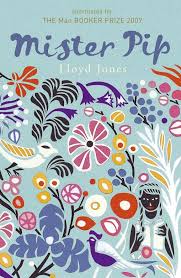Our book group choice in August 2008 is Mister Pip by Lloyd Jones. On a copper-rich tropical island shattered by war, where the teachers have fled with most everyone else, only one white man chooses to stay behind: the eccentric Mr. Watts, object of much curiosity and scorn, who sweeps out the ruined schoolhouse and begins to read to the children each day from Charles Dickens’s classic Great Expectations.
Mister Pip is a novel by Lloyd Jones that tells the story of Matilda, a 13-year-old girl who lives on the island of Bougainville during the civil war. When the teachers flee the island, the only white man left, Mr. Watts, takes over the schoolhouse and begins to read aloud from Charles Dickens’ Great Expectations. Matilda is captivated by the story of Pip, and she finds herself transported to another world, a world where anything is possible.
As the war rages on, Matilda and her classmates cling to the story of Pip as a source of hope. Mr. Watts’s readings become a lifeline for the children, and they begin to see themselves in Pip’s story. Matilda, in particular, identifies with Pip’s journey from poverty to wealth, and she begins to dream of a better life for herself.
One day, a group of soldiers arrive in the village and demand that Mr. Watts stop reading Great Expectations. The soldiers believe that the book is a dangerous influence, and they threaten to kill Mr. Watts if he does not comply. Mr. Watts refuses to stop reading, and he is eventually killed by the soldiers.
Matilda is devastated by Mr. Watts’s death, but she continues to cling to the story of Pip. She believes that Pip’s story will help her to survive the war and to build a better life for herself.
In the aftermath of Mr. Watts’s death, Matilda and her classmates decide to reconstruct Great Expectations by memory. They each contribute whatever scenes they can remember, and Mr. Watts writes them down in his journal. This process helps the children to come to terms with Mr. Watts’s death, and it also helps them to preserve the story of Pip.
Discussion Questions
- Is it important that Mr. Watts is the last white man on the island? Why?
- Why does Matilda write Pip’s name in the sand alongside the names of her relatives? Why does this upset her mother? How does this contribute to Dolores’s feelings about Mr. Watts’s instruction of her daughter? Are these feelings understandable?
- Why do you think Mr. Watts pulled his wife in the cart? Why did he wear the red clown nose? What meaning did that have for them?
- What is the message Matilda’s mother is trying to express to the children with the story of her mother’s braids? How is this related to the issue of Mr. Watts’s faith in God?
- What did you think of the lessons that the mothers of the children bring to the classroom? If you were the parent of a child in Matilda’s class, what lesson would you teach the children? What might your mother have taught the class?
- Who is Dolores warning the children about when she tells them the story about the devil lady and the church money? How does this story justify her actions regarding the book and the redskins? Do you agree with Dolores’s refusal to bring forth the book? With Matilda’s?
- Where do you think Gilbert’s father takes Sam? How do you know? In your opinion, was it necessary that he do so?
- Why does the corned beef in Mr. Watts’s house “represent a broad hope” for Matilda? Discuss Mr. Watts’s reaction to Matilda’s fragment. Do you believe that Grace was alive when Matilda arrived?
- Discuss how the characters in this story struggle to reconcile the concepts of race and identity. Does it seem to dictate their interaction with each other? How does it influence their concepts of self? What moments, especially, helped reveal this to you?
- What is the meaning of the story of the Queen of Sheba? Why does Mr. Watts bring it up? Why is it significant that Dolores is familiar with that story?
- Why does Dolores step forward to declare herself “God’s witness” to the murder of Mr. Watts? Were you surprised that she did? Why does she insist that Matilda remain silent?
- Do you think Matilda was able to return home? How would that outcome affect your reading of both novels?
- Discuss your memorable experiences of being read to as a child. What book made the greatest impact on your life? Did any book come to you at precisely the right time, the way Great Expectations was brought to Matilda?

